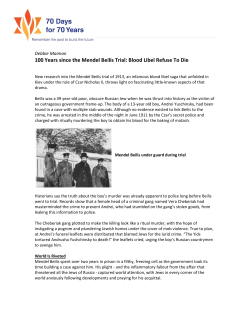
About the conference Organizers Kateřina Čapková, on behalf of the Institute
About the conference Polish-Jewish and Czech-Jewish history are often seen as following two different lines of narrative. While historians of Bohemian and Moravian Jews tend to focus on the impact of Austrian-Jewish and German-Jewish history and tend to see Bohemian and Moravian Jews as part of west European or at least central European Jewry, historians generally associate Polish Jews with the east European Jewish experience. Both of those popular images of Czech-Jewish and Polish-Jewish history are gross over-simplifications, obscuring many shared aspects of Jewish history in these regions. The Prague conference on 29–30 October 2014 aims to bring together scholars who specialize in the history of the Jews of Poland and/or the Bohemian Lands, in order to discuss shared topics, the current state of research, and the differences and similarities in their approaches and results. Organizers Kateřina Čapková, on behalf of the Institute of Contemporary History, Czech Academy of Sciences capkova@usd.cas.cz Þ Marcin Wodziński, on behalf of the Department of Jewish Studies, University of Wrocław wodzinsk@uni.wroc.pl Þ Sponsored by For additional information Visit our website: R www.jewishhistory.cz/konference-workshopy/ Galician Jews in Marienbad, c. 1930 (From the collection of František Bányai) Villa Lanna, Prague, 29–30 October 2014 The conference will be divided into five panels considering key topics of the history of the Jews of both regions. These topics have been chosen to cover the major aspects of the Jewish experience and to compare research on these topics in both of the histories. Czech-Jewish and Polish-Jewish Studies: (Dis)Similarities Programme WEDNESDAY, 29 OCTOBER 10:00 Welcome Keynote speech by Hillel Kieval: Czech-Jewish and Polish-Jewish History: Possibilities for a New Paradigm PANEL I Early Modern Period 11:00-13:00 Chair: Moshe Rosman Two introductory papers Adam Kaźmierczyk: Poland-Lithuania Rachel Greenblatt: The Bohemian Lands Two project presentations Cornelia Aust, Jewish Appearances and Their Perceptions in Early Modern Poland Pavel Sládek, The Networking of Ashkenazi Rabbis, c.1560–c.1620: Italy, the Bohemian Lands, and Poland PANEL III Gender and Family 16:30 – 18:30 Chair: Shaul Stampfer Two introductory papers Moshe Rosman: Poland–Lithuania Martina Niedhammer: The Bohemian Lands Two project presentations Tsippi Kauffmann, An Aberration of Nature: Temerel, a Woman Hasid Verena Kasper-Marienberg, Socio-Economic Profiles of Jewish Families in Rural Bohemia: The Kauder Family in Hluboká nad Vltavou (Frauenberg) in the 17th and 18th Century PANEL V Postwar Period 11:30- 13:30 Chair: Gertrud Pickhan Two introductory lectures Michael Meng: Poland Kateřina Čapková: The Bohemian Lands Two project presentations Agnieszka W. Wierzcholska, ‘Our People’s Motherland’: The Jewish Social and Cultural Society (TSKŻ) in Postwar Poland from a Local Perspective Sarah Cramsey, ‘The Most Significant Spot in Europe’: How 130,000 Jews and the Ethnic Revolution came to Náchod, Czechoslovakia, in 1946 19:00 Dinner (and the option of a postprandial walk to Prague Castle) 13:30-14:30 Lunch 14:30-15:30 Concluding discussion 13:00 – 14:00 Lunch THURSDAY, 30 OCTOBER PANEL II Demography and Migration 14:00-16:00 Chair: Hillel Kieval Two introductory papers Shaul Stampfer: Poland–Lithuania Michael L. Miller: The Bohemian Lands Two project presentations Jurgita Verbickiené, Where Did the Jews of the Grand Duchy of Lithuania Live in the Second Half of the 18th Century? The Development of a Network of Communities Michal Frankl, Refugees, loyalty, and a nation-state under Construction: Jewish Refugees in the Bohemian Lands during and after the First World War PANEL IV Concepts of Modernity and Identity 9:00 – 11:00 Chair: Anne-Christin Saß Two introductory papers Marcin Wodziński: Poland Ines Koeltzsch: The Bohemian Lands Two project presentations Rachel Manekin, Resisting the Bohemian Model: The Galician Jewish Struggle against a Uniform Modernization Path Louise Hecht, Christian Printers as Agents of Jewish Modernization? Jewish/Hebrew Printing Houses in Prague, Brno, and Vienna, 1780–1820 16:00 – 16:30 Coffee break 11:00-11:30 Coffee break 16:00-18:00 Tour of the Jewish Museum in Prague (optional)
© Copyright 2025





















